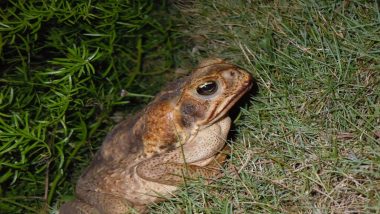After the recent discovery of a green-coloured nonvenomous snake from Arunachal Pradesh, three new species of horned frogs have been found in North East India. After extensive research of 14 years, a team of scientists three new species of horned frogs of the genus Megophrys or Asian Horned Frogs in Nagaland and Manipur. These frogs have elongated upper "eyebrows" which is why they are called Asian Horned Frogs. The new findings were published in the Journal of Natural History. Salazar Slytherin Discovered in Arunchal Pradesh! New Pit Viper Snake Named After Harry Potter Character.
The research team included Irish and Indian biologists. The team members were from University College Dublin (Ireland), the Natural History Museum (UK), and the University of Delhi. The new frogs were found in Nagaland and one from Manipur’s Tamenglong district. These new species were not known or recorded in science before. They belong to the genus Megophrys. The names of these new frogs have been kept Megophrys awuh (Naga Hills Horned Frog), Megophrys numhbumaeng (Tamenglong Horned Frog) and Megophrys dzukou (Dzukou Valley Horned Frog). Frog Caught Eating One of The Most Venomous Snakes in The World! (View Pics).
Check The Pic of Horned Frog Here:
#Positive news.
Though we are adamant on destroying existing #biodiversity yet much beauty is still un-discovered in our lands. Three new #species of Horned Frogs discovered from North East India. 14 years of research work to identify species.https://t.co/d7fwVjLrhn pic.twitter.com/UIc6JH35ks
— Parveen Kaswan, IFS (@ParveenKaswan) May 2, 2020
The word awuh means frog in the Pochury tribe. The second frog gets its name from (Ruangmei) word nwmbwmaeng, which means "forest spirit." Rongmei were the primary natives in the district of Tamenglong in Manipur. The third frog was found in the Dzkou valley so it is named after the place. The team was studying a group of small horned frogs when they made these new findings. And these discoveries were a result of 14 years of research and 7 years of fieldwork in wettest terrains in North East.
Besides, these three new species, the team also found about the wide distribution of other four to five frogs here. As Dr Stephen Mahony the lead author of the research paper was quoted to local media, "This study is a testament to how little is known about the most threatened animal groups, frogs, in northeastern India. Our work has completely changed what we thought we knew about these secretive animals, from how to identify the different species and how they are related to each other, to where they live and how vulnerable they may be to deforestation."
(The above story first appeared on LatestLY on May 02, 2020 02:10 PM IST. For more news and updates on politics, world, sports, entertainment and lifestyle, log on to our website latestly.com).













 Quickly
Quickly


